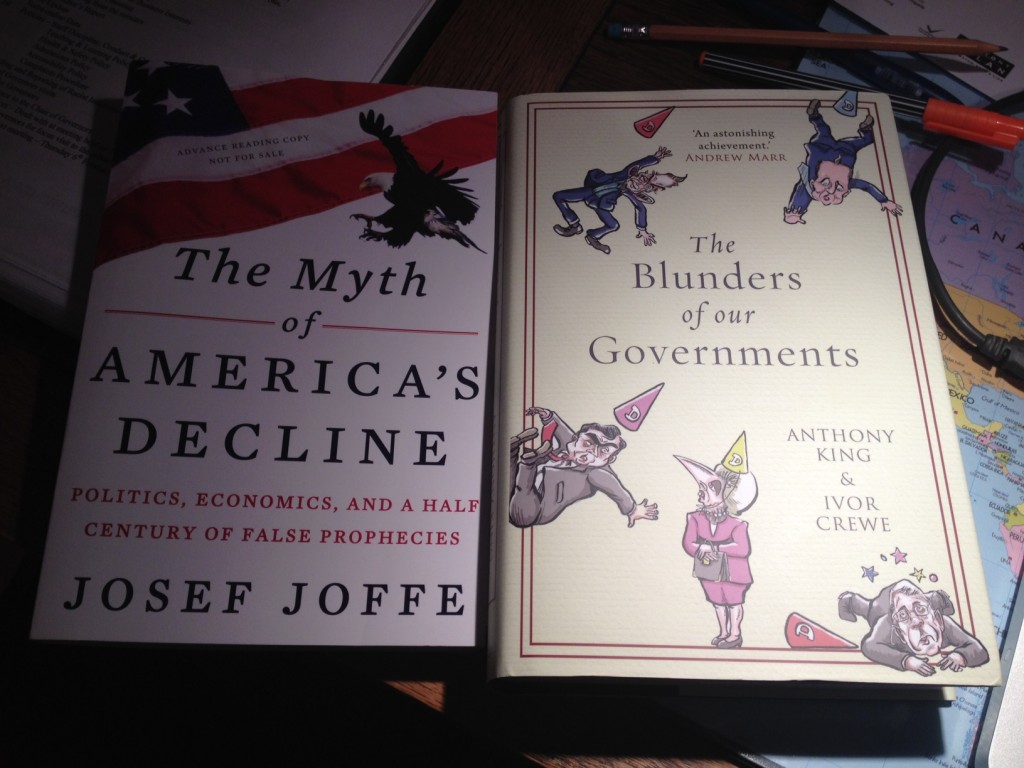I’ve been thinking about what would be covered in my ideal course on economics for public policy. What would really shape economics students into well-informed citizens about government decisions, and useful recruits into the public policy world, while satisfying their evident appetite to engage with the big issues of the day? Behind this lies the broader question of what economic analysis can contribute to public policy, something I’ve been mulling over for a bit via some lectures (the Tanner lectures in Oxford in 2012 and the Pro Bono Economics lecture in 2013).
If you look around at the public policy economics courses and reading lists available online, universities typically either approach the subject from the perspective of the theory of public goods, public choice theory and transactions cost/institutional economics. Or they take a topics approach so cover, say, education fees and vouchers, valuing the environment, competition policy etc. This is necessarily context-specific, so the readings are about individual countries. Finally, there’s the traditional public finance focus, tax, spending, the welfare state. My undergraduate option a million years ago was in this tradition – our textbook was Musgrave and Musgrave’s [amazon_link id=”0070441278″ target=”_blank” ]Public Finance in Theory and Practice[/amazon_link]. It’s rather interesting to see that there are completely distinct approaches.
The most-used texts (in the UK) seem to be:
[amazon_link id=”0199297819″ target=”_blank” ]The Economics of the Welfare State[/amazon_link] – Nicholas Barr
[amazon_image id=”0199297819″ link=”true” target=”_blank” size=”medium” ]Economics of the Welfare State[/amazon_image]
[amazon_link id=”0393966518″ target=”_blank” ]The Economics of the Public Secto[/amazon_link]r – Joseph Stiglitz
[amazon_image id=”0393966518″ link=”true” target=”_blank” size=”medium” ]Economics of the Public Sector[/amazon_image]
[amazon_link id=”0230553001″ target=”_blank” ]The Economics of Social Problem[/amazon_link]s – Julian LeGrand, Carol Propper and Sarah Smith
[amazon_image id=”0230553001″ link=”true” target=”_blank” size=”medium” ]The Economics of Social Problems[/amazon_image]
I have on my shelf Lee Friedman’s [amazon_link id=”0691089345″ target=”_blank” ]The Microeconomics of Public Policy Analysis[/amazon_link], which I like, although it’s US-centric. Jonathan Gruber’s [amazon_link id=”1429219491″ target=”_blank” ]Public Finance & Public Policy[/amazon_link] has been recommended to me, but it’s a silly price.
There are obviously some classics too, at least for the first approach, such as Tullock’s [amazon_link id=”0865972184″ target=”_blank” ]The Calculus of Consent[/amazon_link], Olson’s [amazon_link id=”0674537513″ target=”_blank” ]Logic of Collective Action[/amazon_link], Ostrom’s [amazon_link id=”0521405998″ target=”_blank” ]Governing the Commons[/amazon_link], Schelling’s [amazon_link id=”0393329461″ target=”_blank” ]Micromotives and Macrobehaviour [/amazon_link](one of my all-time favourite books).
[amazon_image id=”0393329461″ link=”true” target=”_blank” size=”medium” ]Micromotives and Macrobehavior[/amazon_image]
My thoughts are still unformed, so I’d be interested to know what other people would recommend.

